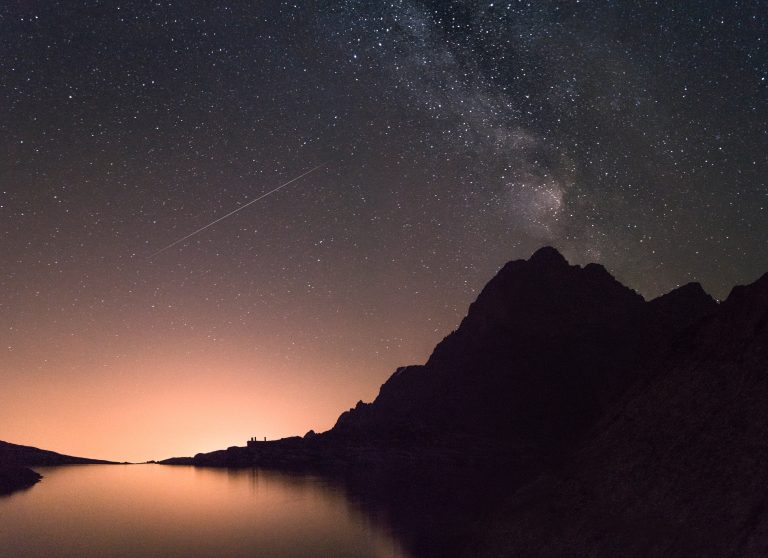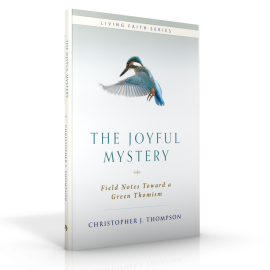By Christopher J. Thompson
Dr. Christopher J. Thompson is the director of the Institute for Theological Research and a professor of Moral Theology at the University of St. Thomas. His books and essays focus on issues in moral theology, ecology, and Thomas Aquinas. If you’re interested in learning more about the Catholic environmental ethic, pick up a copy of his book The Joyful Mystery: Field Notes Toward a Green Thomism.

Anyone who claims that they are “spiritual, but not religious” is like the one who claims to be hungry but never eats. Eating is the natural activity that satisfies the hungry; religion is the natural activity that satisfies the spiritual. If you are truly immune from any religious practices, then you may have a remarkably imaginative interior life, but you are not spiritual.
It is the most natural of human endeavors to seek the truth about God, and therefore it is only natural to pursue a relationship. As the Catechism puts it, “For man is by nature and vocation a religious being . . . and is made to live in communion with God in whom he finds happiness.” And while that relationship may take many forms, the common thread weaves back to its origins in recognizing one’s status as “being made” by a Maker, a creature with a Creator. As such, “religion denotes properly a relation to God. For it is He to Whom we ought to be bound as to our unfailing principle; to Whom also our choices should be resolutely directed as to our last end; and Whom we lose when we neglect Him by sin, and should recover by believing in Him and confessing our faith.” Given the setting we find ourselves in, Thomas says, it only stands to reason that we should do something by way of reverence to God. That something is religion.
And what is that setting? It is an inexhaustible, beautiful cosmos given by a God who supremely loves us. I have already spoken of awe in the presence of the created order and wish to reaffirm, again, its catechetical power in coming to know and love God. Discerning its beauty, its order, its unfolding, its fragility, we can begin to discern with growing confidence a knowledge of God as the one who has made all of this. We read in St. Augustine, “Question the beauty of the earth, question the beauty of the sea, question the beauty of the air distending and diffusing itself, question the beauty of the sky . . . question all these realities. All respond: ‘See, we are beautiful.’ Their beauty is a profession [confessio]. . . . Who made them, if not the Beautiful One who is not subject to change?”
The very passing of things points to the need for something enduring; the fragility of things for something stable. “The world, and man,” the Catechism observes, “attest that they contain within themselves neither their first principle nor their final end, but rather that they participate in Being itself, which alone is without origin or end. Thus, in different ways, man can come to know that there exists a reality which is the first cause and final end of all things, a reality ‘that everyone calls God’.”
While the ecstasy of beauty can bring us to an encounter with the Logos, only revelation can make known fully the God whom we pursue, the God veiled in the beauty of things. The very tentative character of awe, the ambiguity of its disclosure, the weakness of one’s comprehension— and the ache, the longing for something all-permanent— all of it prepares the way for a revelation to meet one’s deepest aspirations as a person, not merely a creature, of the cosmos. The heart is dilated by the presence of beauty, and prayer spontaneously fills the void.
Indeed, “by faith we understand that the world was created by the word of God, so that what is seen was made out of things which do not appear” (Heb 11:3). It was “in him all things were created, in heaven and on earth, visible and invisible, whether thrones or dominions or principalities or authorities—all things were created through him and for him” (Col 1:16). Thus we now see clearly that “ever since the creation of the world his invisible nature, namely, his eternal power and deity, has been clearly perceived in the things that have been made” (Rom 1:20). And thus together, in a spirit of sacrifice and in union with all of creation, we affirm that, “Thou art the Lord, thou alone; thou hast made heaven, the heaven of heavens, with all their host, the earth and all that is on it, the seas and all that is in them; and thou preservest all of them; and the host of heaven worships thee” (Neh 9:6). We do this through public worship so that all “see what is the plan of the mystery hidden for ages in God who created all things” (Eph 3:9).
Knowing that, “Thou art the Lord, thou alone; thou hast made heaven, the heaven of heavens, with all their host, the earth and all that is on it, the seas and all that is in them; and thou preservest all of them; and the host of heaven worships thee” (Acts 17:25). And that it is, “in him we live and move and have our being,” we celebrate and proclaim the fact that, “he chose us in him before the foundation of the world, that we should be holy and blameless before him; he destine us in love to be his sons through Jesus Christ, according to the purpose of his will” (Acts 17:28; Eph 1:4–5).
You Might Also Like

The Joyful Mystery seeks to revive the Church’s practice of integral ecology and encourages a deeper awareness of the presence of God, the Creator and Lord of the universe. In it, author Christopher Thompson draws from the wisdom of St. Thomas Aquinas and the “Green Thomism” he inspires in contemporary life. Readers will come away moved by the presence of God manifest in his glorious cosmos and be drawn to integral ecology as a spiritual response.